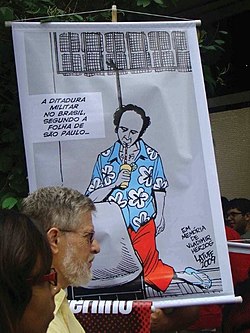Vladimir Herzog
He became a naturalized Brazilian citizen in 1961 [8] After his graduation, he worked as a journalist in the major media outlets in Brazil, notably in the newspaper O Estado de S. Paulo.[3] Following the 1965 right-wing coup d'état Herzog together with his wife Clarice Ribeiro Chaves, moved to Britain, where for three years he worked in London for the BBC.Later in his life, Herzog became active in the civil resistance movement against the military dictatorship in Brazil, as a member of the Brazilian Communist Party (Portuguese: Partido Comunista Brasileiro - PCB).As a news director at the TV station, Herzog advocated the responsibility of journalists to society and reported on the first decade of the Brazilian military dictatorship.The president of the Republic at the time, General Ernesto Geisel was also upset by these and other actions by what he called the "criminals" of the largely parallel power of military-directed violent political repression.[16] After finding out that Herzog's body bore the marks of torture, Rabbi Sobel decided that he should be buried in the centre of the cemetery rather than in a corner, as Jewish tradition demands in cases of suicide.Herzog has become a symbol of the fight for democracy in Brazil and has been honoured in many ways, such as by attributing it to the street where the TV Cultura is located in São Paulo.Later, in a civil lawsuit filed by his widow against the government, a federal tribunal recognized his wrongful death and granted monetary damages to Herzog's family.
OsijekKingdom of YugoslaviaCroatiaSão PauloBrazilMurderSuicideDOI-CODIBachelor's degreeUniversity of São PauloBrazilianCroatian-JewishBrazilian Communist Partycivil resistancemilitary dictatorship in Brazileditor-in-chiefTV Culturapolitical policeSava BanovinaUstashePhilosophyO Estado de S. Paulocoup d'étatLondonSão Paulo StateFundação Armando Alvares PenteadoplaywrightIntelligentsiaPortugueseCarlos LatuffFolha de São PauloDepartamento de Operações de Informações - Centro de Operações de Defesa Internaautopsyforensic pathologistsPublic opinionErnesto Geiselright wingHenry Sobelsynagoguedemocracyfreedomamnestyhuman rightsPrêmio de Jornalismo Vladimir Herzog de Anistia e Direitos Humanoslawsuitmonetary damagesJoão Batista de AndradeLuiz Inácio Lula da SilvaInter-American Commission on Human RightsOrganization of American StatesJosé Maria Marin'sBrazilian Football Confederation2014 FIFA World CupList of unsolved murdersWayback Machinemilitary abuses1964 coup d'étatList of the disappearedArmed struggleInstitutional ActsEconomic miraclePolitical openingNational Truth CommissionMarch of the Family with God for LibertyMarch of the One Hundred ThousandDiretas JáRiocentro bombingDeath of Vladimir HerzogHumberto de Alencar Castelo BrancoArtur da Costa e SilvaEmílio Garrastazu MédiciJoão FigueiredoGolbery do Couto e SilvaRoberto CamposAntônio Delfim Netto